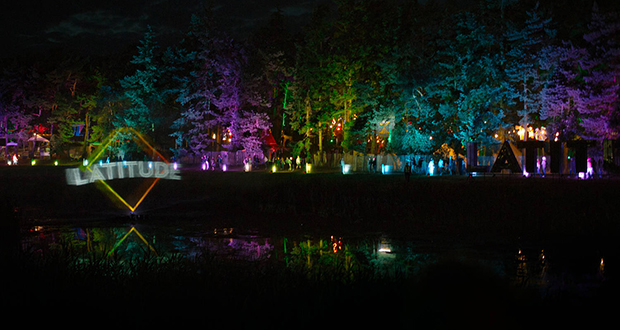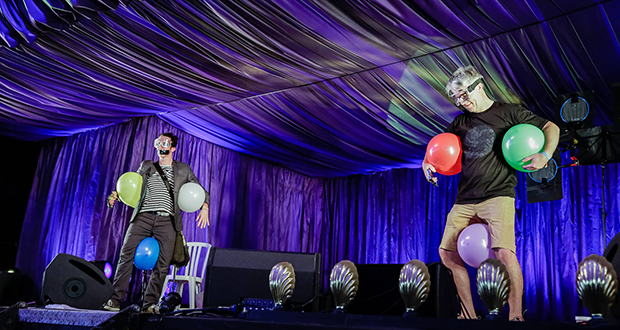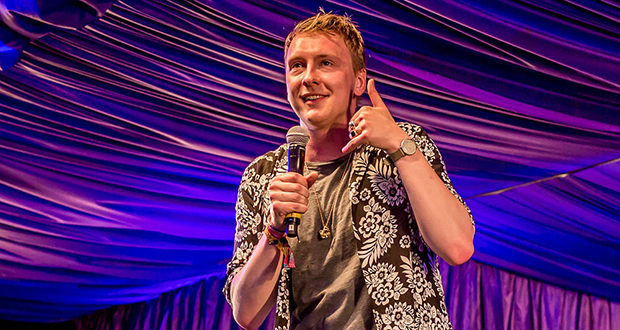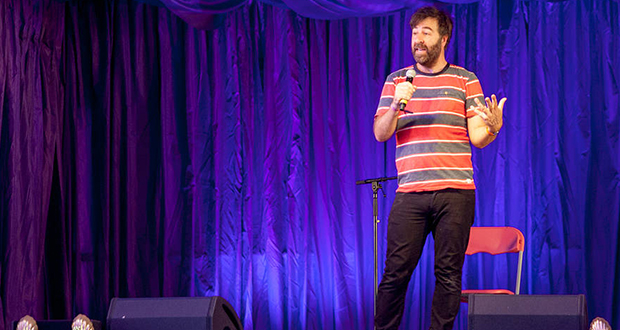Review: Latitude Festival 2016

Credit: Daniel Dennison
Latitude Festival; famously the sort of festival where you can watch an educational talk on mindfulness, catch an early morning yoga session and take a dip in a lake before most people have even loused themselves from their tent.
While the middle-class, artsy nature of the festival often comes in for some stick (take a drink every time a comedian mentions it and chances are you won’t remember the weekend at all) their comedy line-up is utterly unparalleled by any other festival in the country.
This year was no exception. Headliners including Bill Bailey, Russell Howard (work in progress show – our lips must remain sealed) and Paul Merton topped an expansive line-up with countless gems to be found throughout the festival programme. Here’s what we caught over the weekend.
As far as festival openers go, you can’t ask for much better than The Horne Section. On Thursday night the variety troupe kicked things off with its lively combination of stand-up, camaraderie, prop-fuelled audience interaction and blistering musical ability. Alex Horne leads his merry band of musicians through hilarious songs and inclusive bits in a set that plays out like a magnificently silly musical game-show.
In a performance that sees Frank Sidebottom-eaque ditties rattled out alongside furiously harebrained audience challenges and guest sets from Phil Wang and George Egg, all underscored by a full band, The Horne Section is the pinnacle of a great festival comedy show; broad, unique and outrageously fun.

Credit: Kennderleigh Scott
On Friday morning Dane Baptise is the first act to take to the comedy tent’s large, purple stage. A charismatic, effortlessly unruffled performer, Baptiste takes on a wide-range of topics spanning race, the benefits of being a smoker in the modern world and to his life goal of being a Chihuahua; so he can be pampered and carried around in a handbag. Observational but freshly delivered, Baptiste delivers a genial performance, with even the most unpleasant of truths treated with a touch of silliness.
In a programming move that highlights the diversity of the festival’s comedy line-up like nothing else, Baptiste is followed by Piff the Magic Dragon. Fresh from an appearance on America’s Got Talent and a lengthy stint in Vegas, sardonic dragon Piff – and his canine assistant Mr Piffles – turns in a performance with all the sensation you could want from a magic show, and none of the cheese.
Delightfully sour, Piff offers up a genuinely beguiling set of tricks with a mordant charm, subverting the tropes of contemporary magic shows in a refreshingly funny and wicked way.
Speaking of Mr Piffles, Nick Helm is not happy that he has to follow a dog. That’s not to say the Uncle star isn’t capable of out-performing a pup in a costume, but today he just can’t seem to get his act together. Present are all of Helm’s usual tricks of the trade: assaults on his audience, abrasive persona and barked profanities, but on this occasion Helm lacks focus, turning his usually enjoyable ritual humiliation into a shambling series of aggressive conversations with audience members before he eventually returns to the stage.
Helm himself is upfront about his lack of jokes, but his material about getting his phone stolen and his subsequent encounter with the police is presented entertainingly enough; unfortunately it comes a little too late in the day to save his set.
Rhys James fairs much better. Flitting between oblivious smart-arse and self-aware wordsmith, James upends his observations with fun and cerebral twists, peppering his set with puns and elegantly-worded gags.
A perfect fit for the Latitude crowd, middle-aged, middle-class curmudgeon Simon Evans goes down a treat. Boasting a careworn magnetism and a knack for nailing a point with language both astute and amusing, Evans tackles such staples as parenthood, the generation gap and the bloom of wanky, artisan cuisine.
Far from conversational comedy, no line here is wasted. Every utterance is crafted to be a marvel to the ear, eloquent and elaborate. That’s not to say there aren’t punchlines; though they are often swathed in warmly embittered observations, Evans’ deductions are as funny as they are astute.
The first big name of the festival, Al Murray manages to pack out the tent with ease; the people gathered here know what to expect from Murray, and he delivers it in his usual broad, brutish style. There’s not much on display here that we haven’t seen before; the landlord himself is an archaic figure, a beacon of out-dated views and attitudes, so we can hardly expect anything cutting edge.
The material tonight is largely a “best of” collection of audience banter and European stereotypes. He knows how to please a crowd, and please them he does. Despite the familiar nature of his performance, Murray’s larger than life character is always a pleasure to watch, and his breathless historical satire of the “immigrants coming over here and taking our jobs” is impressive to behold.

Credit: Jen O’Neill
Character comic Joe Bor’s foppish alter-ego Jasper Cromwell-Jones – an upper-class berk with enough money that he can consider himself an “adventurer” and not just unemployed – is first to the stage on Saturday. Endearingly clueless, Cromwell-Jones mines all of the classic toff stereotypes with aplomb, as he reads from his latest book about his worldly adventures, playfully asserting his assumed superiority over the audience. Is the basis of the act essentially low hanging fruit? Yes. Is it funny? Absolutely.
There aren’t too many acts that can smash a Saturday morning festival show, faced with groggy, hungover punters, but The Boy With Tape on His Face makes short work of a tough slot. Combining inventive mime, musical queues and smart use of props (including audience members) The Boy With Tape on His Face gives a magical performance that’s all the right kinds of twee.
The Boy enraptures the audience with his quick-fire physical gags and hilariously endearing set pieces, including directing three members of the crowd in a choreographed dance to a Michael Jackson track. The best kind of accessible comedy, The Boy mines more laughs and good feeling with his mouth gaffa-ed shut than many more vocal comics could ever hope for.
A weak link in an otherwise strong day of comedy, Joel Dommett‘s set is let down by an absence of strong material. Self-deprecating, although not quite enough to dent his curated image or provide any real insight, Dommett is that Radio One kind of dorky; all style and no substance.
While his vapid enthusiasm just about carries him through the set, his material is strictly middle of the road. His quips about the life of a low-level celebrity and internet dating manage vaguely amusing but lack any real depth or pay-off. While Dommett is perfectly amiable, it’s telling that the biggest reaction from the crowd comes when he is upstaged by an ill-timed confetti canon set off by an audience member.
Joe Lycett on the other hand shows just how funny you can be if you’re willing to push the right boundaries. Of course you need a little bit of charm and likability to get away with it, and Lycett has that in spades. Simultaneously affable and catty, Lycett utilizes his mischievous nature with surreal and misshapen stories, and even shares his plan to take down ISIS through Grindr. And it’s so impossible to dislike Lycett, he must just succeed.
Over in the Cabaret Tent, Richard Gadd is about to preview his new show Monkey See, Monkey Do, and festival security are ushering children out of the area. And with Gadd’s reputation for visceral, violent and disturbing performances, it’s probably for the best. Gadd’s new show features a similar format to his previous outings; more viciously funny performance art than traditional comedy, Gadd utilizes multimedia elements in a gut-wrenchingly candid dismantling of his psyche.
In a deeply affecting, and cleverly constructed performance with themes such as mental health and masculinity, Gadd keeps the tension high and the audience guessing right up until its devastating conclusion, peppering the show with dark and often absurd humour. Easily one of the best shows at Latitude, Monkey See, Monkey Do is certain to be one of the Fringe’s must-see shows when it arrives there next month.

Credit: Daniel Dennison
David O’Doherty kicks off the festival’s last day with a genial, incisive and feel-good set from behind his tiny keyboard. Reflecting on his childhood in an overwhelmingly white, Catholic Ireland and the progress the country has made, O’Doherty paints an intuitive and warming picture that is a joy to behold. Not content to be a pleasing raconteur, O’Doherty also has an arsenal of tremendous gags at his disposal, a result of his quirky wit and mastery of phrasing, which he drops casually into his set alongside his catchy, humorous songs.
There’s plenty of pathos behind his beautifully illustrated set pieces too, with smart observations about the pursuit – and outward projection – of happiness, though the overall tone is one of articulate whimsy and togetherness.
Jen Kirkman is jet-lagged. We know this because she tells us, every time her bit drizzles out to silence, every time she states an incorrect fact, and every time she looks for a clock to see how long she has left. It’s a lame excuse from someone who does this for a living; Kirkman appears as though she’s just been shoved on to the stage with nothing prepared and no concern for the audience she’s playing to. The bulk of her set – when she’s not apologizing for having bad hair or being easily distracted – is made up by a PSA about harassing women.
A fair point, it could have been well made, but the few entertaining things she has to say on the matter are bogged down in waffle and quickly lose their way. Struggling to fill her time, stories about her tattoo or buying her t-shirt fail to spark interest, and she receives about as much enthusiasm from the audience as she gives them.
Critically-acclaimed (his words) comedian Nish Kumar opens with a self-effacing bit about what his critical acclaim actually translates to – long words, broadsheet praise and empty seats. If it’s true it’s a damned shame, as Kumar presents a set this afternoon of masterful comedy.
Pointed and decisive, Kumar deftly moves between personal tales of his musical idols to the Labour leadership crisis and the post-Brexit rise in overt racism. Far from preaching to the choir, Kumar offers salient points, brilliantly and hilariously made, with confidence and bristling intelligence.
Here comes that programme diversity again; if Nish Kumar is the Thick of It of the Sunday’s line-up, Al Porter, who follows, is Mrs Brown’s Boys. The young Irish comic is a motor-mouth with little to say. Porter talks at the audience about his sex-life and the inhabitants of his rough Dublin hometown, feigning insincere disgust where he feels that an audience should have (they haven’t) reacted to his transparent innuendo.
A dim single mother with a harem of non-English baby-daddies comes in for the most stick, with the loquacious Porter rattling off unpleasant jabs like a camp Bernard Manning. It’s not that there’s no place for the old-school in stand-up anymore, but there are some aspects of the Carry On era that were left behind for a reason, and Porter’s archaic, contrived schitck is far from the kind of nostalgia anyone longs for.
With a dedicated comedy arena hosting the biggest names in telly comedy, as well as sketch, character comedy and up-and-coming stand-ups to be found across their cabaret, literature, and children’s stages, the variety and quality of Latitude Festival’s comedy offering is quickly garnering it a reputation as the best non-comedy comedy festival in the country.
If it’s laughter you’re after, roll up your yoga mat and head to Latitude.



































